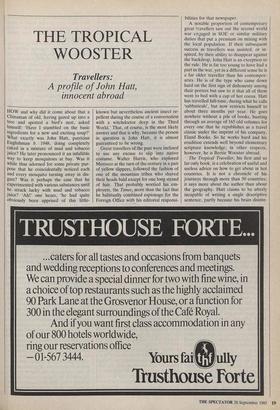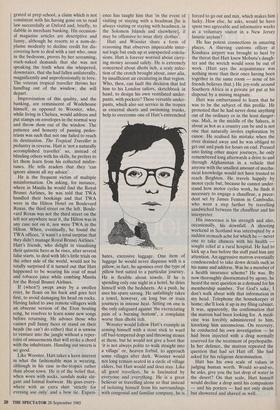THE TROPICAL WOOSTER
Travellers: A profile of John Hatt, innocent abroad
HOW and why did it come about that a Chinaman of old, having gazed up into a tree and spotted a bird's nest, asked himself: 'Have I stumbled on the basic ingredients for a new and exciting soup?' What exactly was John Hatt, patrician Englishman b. 1948, doing completely caked in a mixture of mud and tobacco juice? He later pronounced it an infallible way to keep mosquitoes at bay. Was it while thus adorned for some private pur- pose that he coincidentally noticed each and every mosquito turning away in dis- gust? Was it perhaps the case that he experimented with various substances until he struck lucky with mud and tobacco juice? `Ah!' one hears, 'he had quite obviously been apprised of this little-
known but nevertheless ancient insect re- pellent during the course of a conversation with a witchdoctor deep in the Third World.' That, of course, is the most likely answer and that is why, because the person in question is John Hatt, it is almost guaranteed to be wrong.
Great travellers of the past were inclined to use any excuse to slip into native costume. Walter Harris, who explored Morocco at the turn of the century in a pair of yellow slippers, followed the fashion of one of the mountain tribes who shaved their heads bald except for one long strand of hair. That probably worried his em- ployers, the Times, more than the fact that he habitually combined espionage for the
Foreign Office with his editorial responsi- _ bilities for that newspaper.
A notable proportion of contemporary great travellers saw out the second world war engaged in SOE or similar military duties that put a premium on mixing with the local population. If their subsequent success as travellers was assisted, or in- spired, by their ability to disappear against the backdrop, John Hatt is an exception to the rule. He is far too young to have had a part in the war, yet in a different sense he is a far older traveller than his contempor- aries. He is of the type who came down hard on the first sign of dishonesty among their porters but saw to it that all of them went to bed with a cup of hot cocoa. Hatt has travelled full-time, during what he calls `sabbaticals', but now restricts himself to about three months per year. He goes nowhere without a pile of books, hunting through an average of 165 old volumes for every one that he republishes as a travel classic under the imprint of his company, Eland Books. So he works hard and his erudition extends well beyond elementary scripture knowledge; in other respects, however, he is Bertie Wooster abroad.
The Tropical Traveller, his first and so far only book, is a celebration of useful and useless advice on how to get about in hot countries. It is not a chronicle of his journeys through more than 50 countries; it says more about the author than about the geography. Hatt claims to be utterly incapable of writing a single descriptive sentence, partly because his brain disinte- grated at prep school, a claim which is not consistent with his having gone on to read law successfully at Oxford and, briefly, to dabble in merchant banking. His occasion- al magazine articles are descriptive and funny, although he resorts to a nom-de- plume modestly to decline credit for dis- covering how to deal with a tart who, once in the bedroom, proves by her screaming, stark-naked demands that she was not speaking the truth when she whispered, downstairs, that she had fallen unilaterally, magnificently and unprofessionally in love. The veteran tropical traveller throws her handbag out of the window; she will depart.
Improvisation of this quality, and the banking, are reminiscent of Wodehouse himself, as opposed to Wooster, who, while living in Chelsea, would address and put stamps on envelopes in the normal way and throw them out of the window. The patience and honesty of passing pedes- trians was such that not one failed to reach its destination. The Tropical Traveller is pedantry in reverse. Hatt is 'not a naturally accomplished traveller' so, instead of blinding others with his skills, he prefers to let them learn from his collected misfor- tunes. He tells readers that they 'can ignore almost all my advice'.
He is the frequent victim of multiple misinformation. On asking, for instance, where in Manila he would find the Royal Brunei Airlines, he was told that TWA handled their bookings and that TWA were in the Hilton Hotel on Boulevard Roxas, the third street on the left. Boule- vard Roxas was not the third street on the left nor anywhere near it, the Hilton was in any case not on it, nor were TWA in the Hilton. When, eventually, he found the TWA offices, 'it wasn't a total surprise that they didn't manage Royal Brunei Airlines.' Hatt's friends, who delight in visualising their quixotic hero as he rises, after several false starts, to deal with life's little trials on the other side of the world, would not be totally surprised if it turned out that Hatt happened to be wearing his coat of mud and tobacco juice while combing Manila for the Royal Brunei Airlines.
If (when?) swept away by a swollen river, he floats on his back and goes feet first, to avoid damaging his head on rocks.
Having failed to awe remote villagers with an obscene version of the Eton boating song, he resolves to learn some new songs before returning. He advises those who cannot pull funny faces or stand on their heads (he can't do either) that it is unwise to venture into the jungle without a reper- toire of amusements that will strike a chord with the inhabitants. Handing out sweets is no good.
Like Wooster, Hatt takes a keen interest in what the fashionable man is wearing, although in his case in-the-tropics rather than about-town. He is of the belief that, when worn with socks, sandals make ele- gant and formal footwear. He goes every- where with an extra shirt 'strictly for evening use only' and a bow tie. Experi- ence has taught him that 'in the event of visiting or staying with a headman [he is always visiting or staying with headmen, in the Solomon Islands and elsewhere], it may be offensive to wear dirty clothes'.
Hatt and Wooster share a form of reasoning that observes impeccable inter- nal logic but ends up at unexpected conclu- sions. Hatt is forever worried about carry- ing money around safely. He is extremely concerned about dhobi itch, a scaly infec- tion of the crotch brought about, inter alia, by insufficient air circulating in that region. Who, then, can fault the decision that led him to his London tailors, sketchbook in hand, to design his own ventilated under- pants, with pockets? These versatile under- pants, which also see service in the tropics as external shorts and swimming trunks, help to overcome one of Hatt's entrenched hates, excessive luggage. One item of luggage he would never dispense with is a pillow; in fact, he agonises over the type of pillow best suited to a particular journey. He is flexible about towels. If he is spending only one night in a hotel, he dries himself with the bedsheets. At a push, he uses his spare sarong. He unfailingly takes a towel, however, on long bus or train journeys in intense heat. Sitting on one is the only safeguard against 'the excruciating pain of a burning bottom', a complaint worse than dhobi itch.
Wooster would follow Hatt's example in arming himself with a stout stick to ward off bad-tempered dogs and throwing stones at them, but he would not give a hoot that 'it is not always polite to walk straight into a village' or, heaven forbid, to approach some villages after dark. Wooster would not long remain seated in a circle of village elders, but Hatt would and does stay. Like all good travellers, he is fascinated by everyone and everything. He is a great believer in travelling alone so that instead of isolating himself from his surroundings with congenial and familiar company, he is forced to go out and mix, which makes him lucky. How else, he asks, would he have spent two agreeable and informative weeks as a voluntary visitor in a New Jersey lunatic asylum?
He has potent connections in amazing places. A thieving customs officer at Kinshasa airport was brought to heel by the threat that Hatt knew Mobutu's daugh- ter and the wretch would soon be out of work. (Hatt says the acquaintance was nothing more than their once having been together in the same room — none of his friends believes that.) He joy-rode around Southern Africa in a private jet put at his disposal by a mining magnate.
Hatt was embarrassed to learn that he was to be the subject of this profile. He protested that he had never done anything out of the ordinary or in the least danger- ous. Mali, in the middle of the Sahara, is about as hot as a country can be and is not one that naturally invites exploration by canoe. He realised his mistake when the river drained away and he was obliged to get out and push for hours on end. Pressed into listing other major journeys, he only remembered long afterwards a drive to and through Afghanistan in a vehicle that anyone with the smallest amount of mecha- nical knowledge would not have trusted to reach Brighton. He travels happily by motor cycle but, because he cannot under- stand how motor cycles work, he finds it necessary to engage a chauffeur, a prece- dent set by James Fenton in Cambodia, who went a step further by travelling sandwiched between the chauffeur and his interpreter.
His innocence is his strength and also, occasionally, his downfall. A shooting weekend in Scotland was interrupted by a sudden stomach ache for which he — never one to take chances with his health sought relief at a rural hospital. He had to kick up a fuss before the staff paid him any attention. An aggressive matron eventually condescended to take down details such as his name and address. Was he a member of a health insurance scheme? He was. By now thoroughly disorientated by agony, he heard the next question as a demand for his membership number. 'For God's sake, I don't walk about with that information in my head. Telephone the housekeeper at home; she'll look it up in my filing cabinet. It was, apparently, the confirmation that the matron had been looking for. A medi- cine was forcibly administered to him, knocking him unconscious. On recovery, he conducted his own investigation — he had been injected with a drug normally reserved for the treatment of psychopaths. In her defence, the matron repeated the question that had set Hatt off. She had asked for his religious denomination.
Hatt has his own scale of values in judging human worth. Would so-and-so, he asks, give you the last drop of water in the desert? On that scale, Hatt himself would decline a drop until his companions — and his porters — had not only drunk but showered and shaved as well.















































 Previous page
Previous page